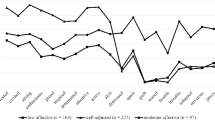Abstract
This research focused on the nature and frequency of positive emotion in a sample of Scottish and Italian young adults and is part of larger scale on-going cross-cultural studies on positive emotion, well-being and happiness. A total of 1043 positive incidents were collected from 157 students who completed diaries in the two countries. Positive incidents were frequent in the course of daily life and were triggered by a wide variety of personal, social and environmental antecedents. Although each culture had a very similar life-satisfaction rating some cultural differences in the phenomenology of positive incidents and their emotions still emerged. As hypothesised Italian and Scottish cultures differed in the domain of independence and interdependence. Italians reported more social interactions involving talking with another and intimacy with a significant other. The Scots, in contrast, reported positive feelings associated with relaxation and being alone as frequently as other social categories, thus exemplifying independence. Recording positive incidents, as they occur moment to moment deconstructs the global and retrospective study of subjective well-being and happiness and fulfills the necessity for ecologically valid research.
Similar content being viewed by others
REFERENCES
Allport, G.: 1961, Patterns and Growth in Personality (Holt, Rinehart & Wilson, New York).
Andrews, F.M. and S.B. Withey: 1976, 'Social indicators of well-being: Americans', Perceptions of Life Quality (Plenum, New York).
Argyle, M: 1999, 'Causes and correlates of happiness', in D. Kahneman, E. Diener, & N. Schwarz (eds), Well-Being: The Foundations of Hedonic Psychology (Russell Sage Foundation, New York).
Balatsky, G. and E. Diener: 1993, 'Subjective well-being among russian students', Social Indicators Research 28, pp. 225-243.
Crosby, F.J.: 1987, Spouse, Parent, Worker: On gender and multiple roles (Yale University Press, New Haven, CT).
Csikszentmihalyi, M.: 1992, Flow: The psychology of happiness, (Rider, London).
Csikszentmihalyi, M. and M.M. Wong: 1991, 'The situational and personal correlates of happiness: A cross-national comparison', in F. Strack (ed), Subjective Well-being: An Interdisciplinary Perspective. International Series in Experimental Social Psychology, Vol. 21, pp. 193-212.
Delle Fave, A. and M. Bassi: 2003, 'Italian adolescents and leisure: The role of engagement and optimal experience', Directory of Child and Adolescent Development 99, pp. 79-93.
Delle Fave, A. and M. Bassi: 2000, 'The quality of experience in adolescents daily lives: Developmental perspectives', Genetic, Social and General Psychological Monographs 126(3), pp. 347-367.
Diener, E.: 1984, 'Subjective well-being', Psychological Bulletin 95, pp. 542-575.
Diener, E.: 1994, 'Assessing subjective well-being: Progress and opportunities', Social Indicators Research 31, pp. 103-157.
Diener, E.: 2000, 'Subjective well-being: The Science of happiness and a proposal for a National Index', American Psychologist 55, pp. 34-43.
Diener, E. and C. Diener: 1996, 'Most people are happy', Psychological Science 7, pp. 181-185.
Diener, E. and M.E. Seligman: 2002, 'Very happy people', Psychological Science 13(1), pp. 81-84.
Diener, E., M. Diener and C. Diener: 1995a, 'Factors predicting the well-being of nations', Journal of Personality and Social Psychology 49, pp. 851-864.
Diener, E., E. Suh, H. Smith and L. Shao: 1995b, 'National differences in reported well being: Why do they occur?', Social Indicators Research 34, pp. 7-32.
Diener, E., E. Suh, R.E. Lucas and H.L. Smith: 1999, 'Subjective well-being: Three decades of progress', Psychological Bulletin 125, pp. 276-302.
Duncan, E.: 1992, 'Investigating incidents of emotion in daily life using the technique of structured diaries', PhD manuscript, University of Glasgow.
Duncan, E. and I. Grazzani-Gazazzi: 2000, 'Positive Emotions and Well-being. A Comparison Between Scottish and Italian Young Adults ' IV Italian Congress of Health Psychology, Orvieto, 21-23 September (in Abstract Book p. 78).
Duncan, E. and I. Grazzani-Gavazzi: 2002, 'What Makes People Happy? A Prospective Diary Study on Positive Emotions in Scottish and Italian Young adults 'in Paper presented at 1st European Congress of Positive Psychology. Winchester, 28th-30th June, 2002.
Duncan, E. and K. Oatley: 1991, 'The Experience of Emotion in Everyday Life', Proceedings of British Psychological Society 4, p. 28.
Egeland, J.A. and A.M. Hostetter: 1983, 'Amish study: I. Affective disorders among the Amish, 1976-1980', American Journal of Psychiatry 140, pp. 56-61.
Friedrich, W.N., D.S. Cohen and L.T. Wilturner: 1988, 'Specific beliefs as moderator variables in maternal coping with mental retardation', Children's Health Care 17, pp. 40-44.
Fredrickson, B.L.: 1998, 'What good are positive emotions?', Review of General Psychology 2, pp. 300-319.
Fredrickson, B.L.: 2001, 'The role of positive emotions in positive psychology. The broaden-and-build theory of positive emotions', American Psychologist 56(3), pp. 218-226.
Frijda, N: 1986, The emotions, Cambridge, UK: Cambridge University Press.
Grazzani-Gavazzi, I. and E. Duncan: 2002 'A diary study on positive emotions and well-being in Scottish and Italian young adults', in G. Bellelli and A. Curci (eds), Emozioni: Cultura, Communicazione, Benessere (Bari, Prog-edit), pp. 157-162.
Grazzani-Gavazzi, I. and K. Oatley: 1999, 'The experience of emotions of interdependence and independence following interpersonal errors in Italy and Anglophone Canada', Cognition and Emotion 13(1), pp. 49-63.
Grazzani-Gavazzi, I., M. Groppo and A. Marchetti: 1998, 'Adolescenti, emozioni e narrazione di Se ´: uno studio attraverso il diario', Eta`Evolutiva 61, pp. 41-54 [Adolescents, Emotions, and Self-narratives: A Diary Study ].
Ito, T.A. and J.T. Cacioppo: 1999, 'The psychophysiology of utility appraisals', in D. Kahneman, E. Diener and N. Schwartz (eds), Well-Being: The Foundations of Hedonic Psychology (Russell Sage Foundation, New York).
Izard, C.E.: 1977, Human Emotions (Plenum, New York).
Jung, C.: 1933, Modern Man in Search of a Soul (Harcourt, New York).
Kahneman, D., E. Diener and N. Schwarz: 1999, Well-Being: The Foundations of Hedonic Psychology (Russell Sage Foundation, New York).
Lyubomirsky, S.: 2001, 'Why are some people happier than others? The role of cognitive and motivational processes in well-being', American Psychologist 56(3), pp. 239-249.
Maslow, A.: 1971, The Farthest Reaches of Human Nature (Viking, New York).
Mastekaasa, A.: 1994, 'Marital status, distress, and well-being: An international comparison', Journal of Comparative Family Studies 25, pp. 183-206.
Matlin, M.W. and D.J. Stang: 1978, 'The Pollyanna Principle: Selectivity in Language', Memory and Thought (Schenkman, Cambridge, MA).
Mesquita, B. and M. Karasawa: 2002, 'Different emotional lives', Cognition and Emotion, 16(1), 127-141.
Markus, H.R. and S. Kitayama: 1991, 'Culture and the self: Implications for cognition, emotion and motivation', Psychological Review 98, pp. 224-253.
Myers, D.G.: 2000, 'The Funds, friends, and faith of happy people', American Psychologist 55, pp. 56-67.
Oatley, K. and E. Duncan: 1991, 'The experience of emotion in everyday life, Cognition and Emotion 8(4), pp. 369-381.
Oatley, K. and E. Duncan: 1992, 'Episodes of emotion in daily life, in K.T. Strongman (ed), International Review of Studies on Emotion (Wiley, Chichester), vol. 2, pp. 249-293.
Oishi, S., R.S. Wyer and S.J. Colcombe: 2000, 'Cultural variation in the use of current life satisfaction in future outlook', Journal of Personality and Social Psychology 78, pp. 434-445.
Robinson, M.D. and G.L. Clore: 2002, 'Belief and feeling: Evidence for an accessibility model of emotional self-report', Psychological Bulletin 128(6), pp. 934-960.
Sandvik, E., E. Diener and L. Seidlitz: 1993, 'Reports of subjective well-being: The converegence and stability of self-report and nonself-report measures', Journal of Personality 61, pp. 317-342.
Satterfield, J.M.: 2001, 'Happiness, Excellence, and optimal human functioning. Review of a Special issue of the American Psychologist (2000; 55, 5-183)', Western Journal of Medicine 174, pp. 26-29.
Sheldon, K.M. and L. King: 2001, 'Why positive psychology is necessary', American Psychologist 56(3), pp. 216-217.
Schkade, D.A. and D. Kahneman: 1997, 'Does living in California make people happy? A focusing illusion in judgements of life satisfaction', Psychological Science 9, pp. 340-346.
Scollon, Diener, Lucas, Oishi & Biswas-Diener (2001, May). 'Accentuate the positive: Exploring Memory for Emotions 'in Paper presented at the Annual Meeting of the Midwestern Psychological Association, Chicago, IL.
Seligman, M.E.P. and M. Csikszentmihalyi: 2000, 'Positive psychology', American Psychologist 55(1), pp. 5-14.
Terman, L.M.: 1939, 'The gifted student and his academic environment', School and Society 49, pp. 65-73.
Triandis, H.C.: 1989, 'The self and social behaviour in differing cultural contexts', Psychological Review 96, pp. 506-520.
Triandis, H.C.: 1990, 'Cross-cultural studies in individualism and collectivism', In J.J. Berman (ed), Nebraska Symposium on Motivation 1989: Cross-cultural Perspectives (University of Nebraska Press, Lincoln, NE) pp. 41-133.
Veenhoven, R.: 1993, 'Happiness in Nations: Subjective Appreciation of Life in 56 Nations, 1946-1992', Erasmus University Rotterdam, Rotterdam, the Netherlands.
Veenhoven, R.: 2003, 'Happiness', The Psychologist 16(3), 128-129.
Author information
Authors and Affiliations
Rights and permissions
About this article
Cite this article
Duncan, E., Grazzani-Gavazzi, I. Positive Emotional Experiences in Scottish and Italian Young Adults: a Diary Study. Journal of Happiness Studies 5, 359–384 (2004). https://doi.org/10.1007/s10902-004-0666-8
Issue Date:
DOI: https://doi.org/10.1007/s10902-004-0666-8




